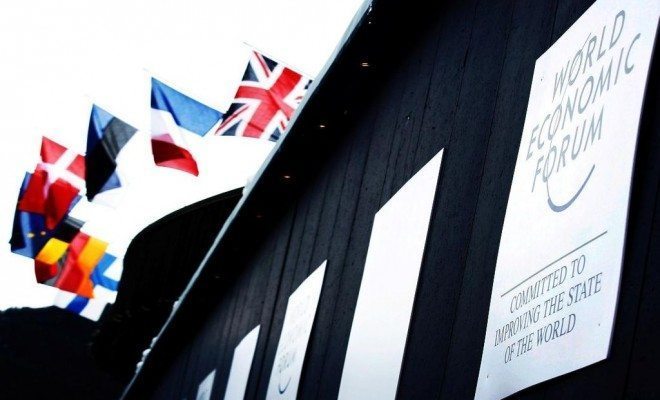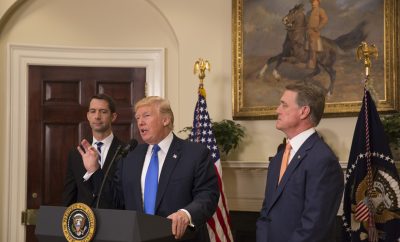 Image courtesy of [MadGeographer via Wikimedia]
Image courtesy of [MadGeographer via Wikimedia]
World
What are the Major Takeaways from the 2016 World Economic Forum?
Every winter, the mountain resort of Davos, Switzerland plays host to the business world’s most eminent economic, journalistic and entrepreneurial minds at the World Economic Forum. The three-day long summit at Davos has repeatedly been lampooned as an obnoxious demonstration of power and privilege that does very little to create significant change in the world economy. However, looking past the elaborate meals and chartered helicopters, Davos can grant insight into what the top tier of the economic sector has planned for the future. Read on for a breakdown of the most important moments at Davos this month and what they mean for 2016.
What is Davos?
The World Economic Forum–a Swiss nonprofit based in Geneva–holds its annual meeting in the ski resort town of Davos, in the Eastern Alps. The meeting is usually comprised of approximately 2,500 business leaders, policy makers, and journalists–referred to as “influencers.” The three-day conference serves as an opportunity to discuss the world’s most pressing economic and social challenges and often serves as a crucial meeting place for building the groundwork for both corporate and political collaboration in the coming year. Davos’ mission is to facilitate public-private sector relations, and while it has done an admirable job of meeting that goal, it is often criticized for being too exclusive or elitist. The Davos invitee list is often limited to only the most profitable economic corporations, mainstream news networks, and representatives from developed nations.
The Issues
Spotlight on Migration
The refugee crisis took center stage at this year’s conference, with political leaders discussing both the nature of open travel across Europe and the impact of the swell of immigrants on the continent’s economy. Dutch prime minister Mark Rutte claimed that Europe has only “six to eight weeks” to save the Schengen system of travel–which allows for unrestricted travel for those who hold visas for any of the twenty-six countries that make up the Schengen zone. Several countries have suspended their Schengen policy and Davos provided opportunities for several ministers and politicians to discuss future plans for border control. Rutte argues that as spring approaches, the number of refugees entering Europe will only swell, potentially leading to a complete shutdown of the Schengen zone’s open border policy. French Prime Minister Manuel Valls also spoke on border policies, claiming that the European Union was not originally built to withstand the challenges of the refugee crisis.
In an interview given in the days before the conference began, billionaire George Soros added to the panic surrounding a European Union breakup by stating that
The EU is on the verge of collapse…the Greek crisis taught the European authorities the art of muddling through one crisis after another… The EU now is confronted with not one but five or six crises at the same time.
Outside of the formal roundtable discussions, Swedish Prime Minister Stefan Löfven spoke out regarding the spike in sexual attacks in Cologne, Germany and other European cities this month, saying that all refugees are not to blame for these crimes and that sexual harassment was problematic in Sweden and other nations long before the refugees arrived.
The Possibility of a “Brexit”
Davos’s discussions focused on the potential of Britain leaving the European Union in 2016 or 2017. Multiple European leaders made fervent pleas to the British representation and citizenry at large to stay within the union, referring to British secession as a “tragedy.” There is no scheduled vote on England leaving but with tensions over the refugee crisis stretching European governments thin, rumors of a potential British exit sent shock waves through Davos. However, Britain would most likely not benefit from exiting the EU in 2016. In a recent interview, Ian Bremmer, president of the Eurasia group, said that
If you’re asking if it is in Britain’s narrow interest to stay in Europe, I would say it is less in their interest than it was a year ago – but I would still make the point that if the Brits leave the EU, the likelihood that Scotland leaves Britain goes up very significantly, and I do believe that’s bad for the UK… Furthermore, leaving the single market, irrespective of the fact that Britain is not in the euro, would damage Britain’s role in finance globally; Britain would take a hit because of that. Also the logistics of the unwinding process, playing out over a couple of years, would be immensely distracting and damaging to both sides. Investment decisions are going to be changed both in the UK and the EU, and both would suffer
The potential “Brexit” dominated politician’s rhetoric at the summit but ultimately appeared to be a red herring as Prime Minister David Cameron stated that he is “not in a hurry” to schedule a vote on a British exit from the EU.
Debt Relief for Greece
During the forum, the IMF’s managing director, Christine Lagarde, and the Greek prime minister, Alexis Tsipras, met briefly to discuss the future of the Greek economy. The IMF has agreed to extend new loans to Greece but it has also publicly stated that it is only prepared to support Greece on a “strings-attached basis.” Greece will need to enact significant economic changes and receive backing from Eurozone partners if it wants to take on IMF funds. Representatives from both the IMF and the Greek delegation referred to the talks as cordial and productive. Tsipras made a statement during Davos promising to reform the Greek economy–while simultaneously criticizing European insistence on lowering budget deficits.
It should be noted that Lagarde, who is responsible for the IMF’s prediction of world economic growth, recently downgraded the statistic to 3.4 percent from 3.6 percent for 2017. This contributed to worries for all countries represented at Davos but should be especially troubling for Greece as it takes on its new package of loans. Tsipras made a series of optimistic statements regarding a rebound for Greece but with limited prospects for growth and the influx of migrants that have swept into Greece, his speeches hardly seem to be realistic.
Discussions on Gender Inequality
Davos featured multiple events on closing the gender gap this year. Historically, Davos has been male dominated and as only 11 percent of company board directors from across the globe are women, the invite list was still mainly masculine this year. However, the organizers of Davos did dedicate specific time and spaces to gender inequality brainstorming sessions and panels. The United Nations brought its HeforShe campaign to the summit. Both Sheryl Sandberg and Justin Trudeau spoke at a panel on gender inequality, advocating for business and political leaders to embrace feminism. The Girls’ Lounge, a space reserved for the 18 percent of Davos attendees who are female, hosted a roundtable discussion on gender inequality during this year’s conference. The discussion focused on making workplaces more equitable and changing the culture of the corporate world. However, German journalist Manuela Kasper-Claridge noted that a great deal of the events on gender inequality were led by men, seriously undercutting the participation of the female attendees. While the soundbites produced at the forum were mainly positive, relatively few attendees committed publicly to promoting gender equality in their corporations or parliaments.
Conclusion
Davos is not a perfect yardstick for upcoming political and economic changes as it only includes a small percentage of the thousands of decision makers involved in the global economy, but it does create a platform for valuable discussion. The refugee crisis continues to dominate the political and economic discussions of European parliaments, and the pressure from the potential withdrawal of Great Britain from the EU has only complicated the debate. Davos is struggling to create gender parity in its annual conference but its efforts this year may open up more discussions in the coming years and prove valuable in the effort to promote feminism in workplaces across the world. Ultimately, Davos is a forum held for ideas not action–there are no votes or referendums that come as a direct result, the stock market does not rise or fall based on its speeches, and many of the attendees are only repeating their position on issues they have discussed time and time again. However, Davos serves as an unparalleled signpost for where European leaders hope to focus their time, energy, and resources in 2016.
Resources
The Guardian: Let’s Make Attending Davos as Shameful as Running a Sweatshop
The Atlantic Sentinal: Weeks Left to Save Schengen, Dutch Premier Warns
The Daily Mail: Davos elites fear weakened European Union
The Irish Times: Number of Migrants Entering Europe ‘Needs to be Reduced’, Davos Hears
CNBC: Migrants Not to Blame for Sex Attacks: Swedish PM
Foreign Policy: Davos Diary: Europe Fears ‘Brexit’ But Not At ‘Any Price
The Telegraph: Davos Leaders Fear ‘Brexit’ May be Deathknell for EU
The Market Mogul: Worries in Davos 2016
The Guardian: IMF Demands EU Debt Relief for Greece Before New Bailout
Quartz: #Davosproblems: The Financial Crisis isn‘t Over, and the Inequality Crisis is Just Beginning
The Guardian: Embrace Feminism to Improve Decision-Making, says Justin Trudeau
Deutsche Welle: Davos, we Have a Gender Problem








Comments